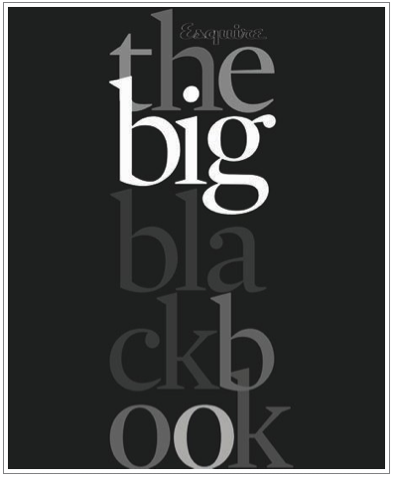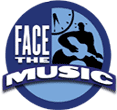Are You My Kinetic Type or Is That a Motion Graphic in Your Pocket?

If a picture is worth a thousand words, then what's a moving picture worth -- or better yet, the word "moving" that's moving?
I am speaking of the fabulous world of kinetic type -- sometimes called motion graphics -- the animation technique that mixes motion and text to express ideas.
The field is not new. It's roots go back to 1899. But the artfulness of it just keeps getting better and better.
Here's a recent example by Mary Jane Fahey.
If you are looking to launch a new campaign, initiative, or get the attention of your information overloaded workforce, think twice before sending yet another email. Think visual. Think graphic. Think kinetic.
Posted by Mitch Ditkoff at 12:39 AM | Comments (0)
April 29, 2011If Only He Had Come to Us Sooner!

Our brainstorming sessions
Our facilitation training
Our innovation workshop
Our interactive keynotes
Posted by Mitch Ditkoff at 12:43 AM | Comments (0)
April 28, 2011How to Change Your Persona
Do you know why Halloween is such a popular holiday in America? Because people get permission to be somebody else for a night.
Wearing a costume makes it easier for people to think and act differently -- one the simplest ways to change perspective and open up bold, new possibilities.
And so, if you are feeling bound by old perceptions, declare today your own, personal Halloween.
Let go of who you think you are. Try on a different mask. Be someone else for a change.
The more you look at the world through the eyes of another, the easier it will be for you to go beyond "business as usual" and have a creative breakthrough.
In other words, ACT AS IF!
WHAT TO DO
1. Choose a new persona -- anyone who inspires or intrigues you.
2. Imagine you actually ARE this person.
3. Identify their approach to your challenge -- the gist of what he/she would do.
4. Using this gist as a clue, jot down a bunch of new ideas about what you might do differently.
This technique is one of 35 described in Awake at the Wheel.
Posted by Mitch Ditkoff at 09:56 PM | Comments (2)
April 27, 2011The Magic of Webinars?

Posted by Mitch Ditkoff at 11:56 PM | Comments (0)
April 23, 2011Chubb Business School Rocks!
NOTE: This is the first in a series of posts about Idea Champions clients who are walking the talk and making great strides towards establishing a sustainable culture of innovation.
When Mary Ann Heenehan became Program Manager of the Chubb Business School in 2008, she knew it was her responsibility to keep the already successful program moving forward with vibrant and cutting edge content.
Precisely what that looked like, she didn't yet know.
The goal of the Chubb Business School had always been a simple one -- to support their business units by offering a "mini-MBA type program" that would broaden the perspective, knowledge, and impact of the company's up and coming talent.
Each year, 140 of Chubb's "high potential, high performers" from all over the world, gathered in Scottsdale, Arizona -- in groups of 40-50 -- for precisely that purpose.
Before Heenehan was on board, the program had focused on business acumen and included traditional modules on ethics, change management, and scenario planning.
The program was very popular and recognized as a hallmark learning event at Chubb. The challenge going forward? To maintain its vibrancy and help participants adapt to a radically changing marketplace.
And so Heenehan decided to focus the program on business acumen and innovation. She wanted CBS participants -- no matter what their function -- to think more creatively.
But even more than that, she wanted participants to be more skillful, proactive, and committed to turning their top of the line ideas into bottom line realities.
Action, not just theory.
Astute veteran of the corporate world as she was, Heenehan knew the program was going to need senior leadership support if it was ever going to get off the ground. She wanted Chubb's senior leaders to support and participate in the program because they wanted to become an integral part of Chubb's still-to-be-determined future.
Enter Jon Bidwell, Chubb's Senior VP and Chief Innovation Officer.
If anything was music to Jon's ears, it was the fact that the Chubb Business School was going to focus on innovation. Jon, quite simply, was on a personal crusade to "increase the value and velocity of innovation" within the firm.

He recognized a golden opportunity, collaborating with Heenehan, "to better connect all the competencies, levels, and geographies of the company -- and to push ideas closer to market needs instead of only being driven from top-down."
"We needed people to connect with each other earlier in the innovation process," explained Bidwell. "Innovation, at Chubb, had to become more than event-driven. It had to become the way we do business on a daily basis."
Bidwell and Heenehan both agreed that the gap between theory and practice had to be crossed -- not by words alone, but by real-time experience. Hands on was the name of game. And so it began.
Inspired by the emerging synergies, Heenehan proceeded to re-design a seamless 5-day program, in collaboration with three outside vendors and Chubb's senior leaders, each of whom had a vital piece of the puzzle.
Day 1 would continue to feature Franklin Covey delivering a business acumen session -- sharing timeless principles on what it takes to run a successful business.
Day 2 would be devoted to innovation and feature Idea Champions delivering a highly interactive session that would challenge people to think outside the box, ideate, and learn creative thinking skills that could be applied back on the job to foster a culture of innovation.
Days 3-5 would continue to focus on the development and implementation of those ideas, via an engaging business simulation facilitated by PriSim, a vendor who had been a long-time learning partner in the CBS program along with Franklin Covey.
Throughout the week, Chubb's senior leaders would present their thoughts and perspectives on topics such as professional development, marketplace conditions, international operations, and business case development.
Heenehan worked hard to integrate all of these elements, making sure all three vendors were familiar with each other's work and able to reference each other to build towards a greater whole.
At the end of each session, unlike most corporate training programs, the impact of Chubb's Business School did not end when the week was over. No way. Things were just beginning to heat up.
Graduates of the program were invited to participate in the "CBS Challenge" which operated within Chubb's innovation platform, Motivate, Drive and Deliver.

Innovation efforts moved through idea generation, facilitation and review, and a series of pitches to surface the best ideas focused on profitability and growth.
Ideas selected by each of the idea teams then moved toward business case development and potential presentation to Chubb's Venture Fund Team. (CBS participants soon found themselves presenting a business case in Chubb's Board Room.)
Rebekah Martin, a graduate of the September, 2009 training, is quite familiar with the process.
Rebekah, a Senior CPI Underwriter from Chicago "didn't have any earth-shattering ideas" during her week of training, but five days later, upon reviewing ideas newly posted on the idea intranet, noticed one particular idea that was very relevant to her job.
Relevant and exciting.
She saw a new possibility -- and now that there was an online idea development process in place, had a way to help midwife that possibility.
Before she knew it, Rebekah had become part of a three-person virtual team to further develop the idea and, soon thereafter, prepare to present that idea to senior management, real-time.
"We had the right three people on the team," explained Rebekah, "so it didn't take that much attention away from my day job at all."
In March 2010, Rebekah found herself at Chubb headquarters, co-presenting the idea with one of her cohorts to some of the company's top officers.

"I was fairly new to the company at the time," Martin chuckled, "so I didn't know who all those people were -- or I might have been really nervous."
The presentation was fast-paced, open and relaxed. Response from senior leaders was quite positive. And Rebekah and her team quickly realized how much easier it was than they had assumed to be a vital part of Chubb's innovation process.
Today, their idea (a way to take better advantage of face-to-face interactions with specific customers) is funded and moving through Chubb's innovation pipeline, along with several other winning ideas that emerged from the Chubb Business School.
Currently, six ideas have been funded through the Venture Fund Team, one idea was funded through a regional program, and five ideas have been pitched directly to the strategic business unit for further development.
Countless other ideas that were not selected for further development within the CBS Challenge are "out there" seeking support through branch or regional channels.
"Graduates of Chubb Business School," explains Bidwell, "come out of the program with a deeper understanding of the mechanics of innovation and how to stage the development of a new idea. Some Chubb employees may think you go from an idea right to a 40-page business case document, but that's not how it works. All new ideas are works in progress. They need to be given a fair hearing, aired out, responded to, developed, and presented in a setting conducive to meaningful feedback."
Adds Martin, "I learned a lot about Chubb from this experience. I learned that I really do have a say in what gets developed and out into the market. I find it refreshing that Chubb is actually interested in my ideas and what I think. My ideas don't have to be world-changing to make a difference. Even the simple ones can make a difference."
The CBS program founder beams.
"I'm really proud of what we've created," explains Heenehan. "People are very intrigued with it. We've taken a good, proven program and taken it up several notches."
What's next?
"Well," says Heenehan, "we're always trying to innovate within the innovation program. Originally, we had the three groups of CBS participants competing against each other. We thought it was a good idea at first, but later found it to be unnecessary. We're all on the same team, after all."
"For the 2011 program we made some changes -- eliminating the competitive aspect and allowed teams to function without the competitive aspect. This year, we're going to be more targeted with our assignments, more collaborative during the actual CBS event, and continue raising the bar for innovation at Chubb in new and exciting ways."
About Chubb
Posted by Mitch Ditkoff at 11:55 PM | Comments (3)
April 21, 2011The Scoop on Google's 20% Time

Here's a nice post from Scott Berkun that demystifies some of the hype and hoopla about Google's "20% time" -- the much talked about practice of the high tech giant that gives their employees permission to spend 20% of their work time on projects born of their own fascination.
Illustration
Posted by Mitch Ditkoff at 01:40 AM | Comments (0)
April 16, 2011How the Ivy League is Killing Innovation
Here's a wonderful article, just published in Bloomberg Business Week that raises a very curious paradox -- why academics are teaching innovation.
Authors G. Michael Maddock and Raphael Louis Viton state their case clearly, cleanly, and with just enough of an edge to draw blood.
"Process-driven cultures love process-driven experts. Organizations, just like people, do what makes them feel strong, and nothing makes mature, process-driven companies feel stronger than having a template for doing anything (even if having a completely buttoned-down-ain't-no-exceptions-allowed template for innovation seems oxymoronic on its face).
Need innovation? Simply call in a PhD with a bow tie and trademarked process and watch your innovation portfolio grow. Right? Nope."
If you are a professor and find Maddock and Viton's article objectionable, speak up! Let them know what you think -- and why. Maybe you're the one who's found a way to teach innovation in a novel, cut-to-the-chase, non-academic way. I know there are some of you out there. Yes?
If you are a high roller in a corporation looking for the "secret innovation sauce," I invite you to read their article before reaching out to academia for your next keynote speaker.
Posted by Mitch Ditkoff at 07:11 PM | Comments (0)
April 14, 2011It's Never Too Late to Create
I sometimes run into people who tell me that their best creative days are behind them -- that they could have accomplished great things if only they had started sooner and that they are "too old" to take on a big, hairy project.
Really?
Think again.
If you have any doubt, click on the link below to get a whiff of what some extraordinary people accomplished late in life.
You may not be a Michelangelo or Stradivarius, but so what? You can still accomplish miracles. All you need to do is begin (and let go of the bogus thought that "it's too late.")
It's not.
1. Grandma Moses started painting when she was 64.
2. Michelangelo designed the dome in St. Peter's Basilica between the ages of 72-88.
3. Stradivarius fashioned his two most famous violins when he was in his early 90's.
4. Mary Baker Eddy established the Christian Science Monitor when she was 87.
5. Frank Lloyd Wright designed the Guggenheim Museum when he was 91.
6. Mahatma Ghandi successfully completed negotiations for Britain to grant India's independence at the age of 77.
7. Golda Meir serviced as Prime Minister of Israel from the ages of 70-76.
8. Peter Drucker wrote "Management Changes for Turbulent Times" when he was 89.
9. P.T. Barnum joined forces with his arch rival, James Baily, when he was 71.
10. Nelson Mandela was inaugerated as the President of South Africa at the age of 75.
11. Noah Webster published "An America Dictionary of the English Language" at the age of 70.
12. Giuseppe Verdi composed his operatic masterpiece, Falstaff, at the age of 80.
13. Pablo Picasso produced a remarkable sereis of 347 etchings at the age of 86.
All examples excerpted from The Creative Age by Gene Cohen. Great book.
Photo
Photo
Photo
Photo
Idea Champions
First Breath, Last Breath
Posted by Mitch Ditkoff at 10:53 PM | Comments (0)
Beer and the Invention of the WheelYou may not know it, but I wrote an award-winning book in 2008, Awake at the Wheel. It's a business fable about the creative process. Easy to read. Fun. A real support for aspiring innovators.
I'm guessing the caveman in the Bud Lite ad below would have found a better way of getting their beer to the party if they had read it.
But enough about me. Let's talk about YOU.
Do you have a creative venture that needs an infusion of mojo, inspiration, and clarity?
Yes? Good. Click. Buy.
Posted by Mitch Ditkoff at 02:22 PM | Comments (0)
Who Says Seniors Aren't Innovative?PS: Stay tuned. Later today, we'll be posting an inspiring article on Creativity Late in Life -- great examples of how elders have done some of their most creative work during their "golden years."
Posted by Mitch Ditkoff at 01:37 PM | Comments (0)
April 05, 2011The Trouble With Experts
When somebody asks if you can do something, pause for a moment before saying "NO." Your first thought may be "that's impossible," but upon reflection you can probably figure out how to pull it off.
Indeed, there is a very good chance that what you are being asked to do is not what is really needed, anyway.
Think about it. We usually evaluate what we can contribute to a situation by imagining that there is someone else who really has the required expertise -- and then we interpret our feelings of uncertainty as proof that we are inadequate compared to this all-knowing other (who, by the way, is going through the exact same drill with someone else.)
Sound familiar?
In reality, our uncertainty (and the humility that, hopefully, accompanies it), are the essential elements of what we really bring to the table -- a curiosity about "the situation" -- and an open mindset that helps us listen to multiple points of view without being ruled by preconceived ideas and solutions.
Being curious enough to arrive at a deep understanding of what the problem really consists of is a much more valuable contribution than a knee-jerk offering of a so-called "solution."
The two main problems with high levels of expertise?
1. When all you have a hammer, everything looks like a nail.
2. If you need to be seen as an expert, you'll have very little opportunity to learn anything.
-- Barry Gruenberg
Posted by Mitch Ditkoff at 03:53 AM | Comments (1)
April 04, 2011Getting Out of the Organizational Box

Last Thursday, I had an opportunity to be the keynote speaker at the Ethical Sourcing Forum, in NYC, a conference sponsored by Intertek, a world class organization dedicated to "helping customers improve performance, gain efficiencies in manufacturing and logistics, overcome market constraints, and reduce risk."
The topic? Sustainable Innovation. Or, more specifically, how people who work in large organizations can get out of the so-called "box".
After the keynote, I was approached by two very animated people from 3BL, a savvy media company specializing in corporate social responsibility, sustainability and cause marketing communications. Apparently, they liked what they heard and wanted to dig deeper -- on camera.
So, it was off to their make shift media center down the hall for an impromptu interview. Click here to watch the 7-minute video.
My innovation keynotes
My speaker's bureau
Posted by Mitch Ditkoff at 03:40 PM | Comments (1)














